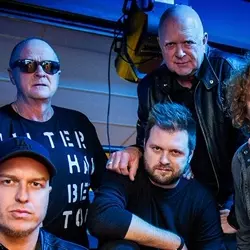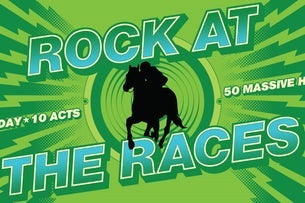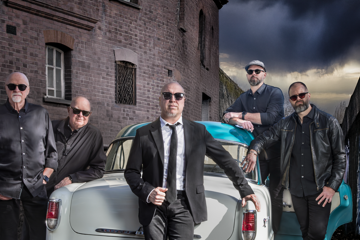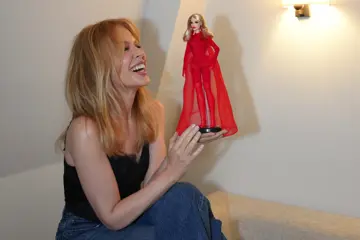 The Angels
The AngelsOne only need look at the chronological tracklisting of The Angels’ new studio collection 1974-2014: 40 Years Of Rock Vol 1 – which fittingly compiles 40 recorded tracks to celebrate their 40-year anniversary – to realise just how quickly things started happening for them once they decided to turn their existing outfit The Moonshine Jug & String Band into a rock’n’roll juggernaut all those years ago.
The Angels didn’t so much hit the ground running during this fertile period of Aussie rock as they arrived sprinting like a well trained athlete, announcing themselves with a string of tracks including Am I Ever Gonna See Your Face Again (their first single, no less), Take A Long Line, Marseilles, I Ain’t The One and Shadow Boxer in an opening salvo of quality that has rarely, if ever, been replicated.
"every spare second we got I was jotting down phrases and two-liners and whatever else"
“It’s just what we did – we lived and breathed it,” recalls founding lead guitarist Rick Brewster. “At that stage we had families but we didn’t have kids, that slows you up, but the whole excitement of writing a song and have other people like it – ‘Oh really, you like it?’ – that just urges you to do the next one, and we did that for years. I carried a notebook everywhere we went – I had dozens of them – and every spare second we got I was jotting down phrases and two-liners and whatever else. And I carried a Sony Walkman mono cassette player so I could record guitar riffs, because the most frustrating thing in the world is sitting down with a guitar and coming up with a good riff, and then the next day you can’t remember it.
“[In a sense though, competition] is what got us started as a rock band – we’d look at the two top bands who at the time were Skyhooks and Sherbet – forgetting AC/DC of course, who were getting there very fast – but Sherbet and Skyhooks were getting all the exposure, and we said to ourselves, ‘We can do that! We just need the opportunity,’ and that’s when we made the decision to start an electric band and went on the road. So it began with a certain degree of competitiveness and brazen confidence of youth, just, ‘Fuck everything, we’re just going to go and do it!’ But the creativity was just because we were living it. We didn’t have that much else to do.”
The fact that they were steadfastly trying to do their own thing is one of the reasons that their canon has stood the test of time particularly well.
Don't miss a beat with our FREE daily newsletter
“It was definitely a conscious decision – and we talked about it a lot – that any time we felt that we were getting too heavily influenced by what was fashionable we’d just knock it on the head,” Brewster continues. “We didn’t want to follow people, we wanted people to follow us because that’s what makes great music. And that’s what makes it timeless. With the songs, particularly lyrically, we had the same attitude – we didn’t want to write anything that was going to be dated in a year or five years or ten years. It had to be interesting and maybe a bit obscure, so that you could make what you want of it. Dylan was a big influence in that regard, especially for John [Brewster – rhythm guitar] but for me too, and Doc [Neeson – original vocalist]. When you heard a new Dylan song you knew instantly that it was going to be around forever because it wasn’t related to that year or what was happening on that year; The Times They Are a-Changin’ might have been relevant back in 1964 or whatever it was but it’s just as relevant today.”
“We didn’t want to follow people, we wanted people to follow us because that’s what makes great music"
Sadly Brewster’s conversation with The Music took place just days before The Angels’ former frontman Doc Neeson – who’d been through a rather fractious period with the band in recent times – lost his battle with a debilitating brain tumour, and although Brewster remains fiercely loyal to the current incarnation of the band it was clearly a tough time for all involved.
“There’s always a sadness whenever anybody gets gravely ill like that,” Brewster reflects with obvious emotion. “We lost [founding bassist] Chris Bailey a year ago and that was tragic, and Doc is the same thing except that we haven’t been as close to Doc as were to Chris because Doc left almost four years ago now and we’ve hardly seen him since then. We’ve spoken to him and had emails back and forth or whatever and we miss him, but it’s more in a reminiscing manner. We had great times with Doc in the early days of the band and it was a real brotherhood, and we’ve got a similar thing going on now with the current line-up.
“Doc removed himself from it when he left the band, and now it’s just a really sad thing that’s happening but musically you move on – it’s still The Angels, John and I are there and we just love the fact that we’ve still got the band happening and it’s a good band and it goes off at live gigs and we’re still writing songs and recording them. It’s just a great thing to do and we’re still able to earn a living from it, so we’ve got no complaints there. I just hope for Doc that… it’s never going to be easy what’s happening to him… I don’t know much about where he is at the moment but he can’t be good, and our thoughts and wishes are with him.”


























